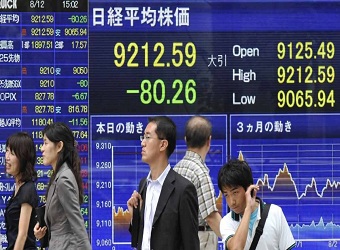Asian markets rose on Wednesday, taking overnight cues from Wall Street where stocks rose to record highs after a rally in tech names lifted the broader market. Hong Kong’s main index topped the 30,000 level at market open.
Australia’s ASX 200 finished up 22.87 points, or 0.38 percent, at 5,986.40, with most sectors advancing. The energy subindex was up 1.22 percent and the materials sector rose 0.81 percent.
The heavily-weighted financial subindex gained 0.18 percent even as three of the country’s so-called Big Four banks fell.
Shares of ANZ fell 0.31 percent, Westpac was off by 0.41 percent and the National Australia Bank lost 0.27 percent. Commonwealth Bank shares, however, were up 0.58 percent.
Japan’s Nikkei 225 gained 0.58 percent in afternoon trade, while the Topix was up 0.44 percent. In South Korea, the Kospi rose 0.39 percent.
Chinese markets traded mixed. The Shanghai composite rose 0.76 percent, and the Shenzhen composite slipped 0.12 percent.
Hong Kong’s Hang Seng index broke the 30,000 level and rose near 1 percent to 30,111.06 at 1:30 p.m. HK/SIN.
“Markets have remained mostly range-bound ahead of Thanksgiving holidays, although there was a small easing in the dollar on a broad basis,” Wei Liang Chang, a currency strategist at Mizuho Bank, wrote in a morning note.
Long-term U.S. government debt yields fell on Tuesday, while short-term Treasury yields rose. That “flattening” trend is usually present before an economic downturn as risk inflates short-term debt yields.
One economist said a flattening trend did not necessarily mean that recession was imminent.
“We wrote about this some time ago, noting that [the flattening yield curve] was unlikely to be a reliable guide to looming recession risk, despite a slow drift of market names to embrace this view,” Rob Carnell, head of research for Asia at ING, wrote in a note.
Carnell explained that at the long end of the yield curve, things are “remarkably stable.” He pointed out that changes were at the front end of the yield curve.
“And what appears to have driven this front-end rise is the final realization by markets that the Fed is not a “one and done” organization, but really will be following up the December hike with another, and then probably another next year,” he said. Carnell also pointed out that the market was previously “reluctantly pricing in tightening only one meeting at a time, being prepared to price the next hike slowly, only once the last one was safely in the bag.”
On Wednesday afternoon Asia time, the yield on the benchmark 10-year Treasury note was at 2.3560, while the yield on the 30-year bond was at 2.7577 at 1:31 p.m. HK/SIN. Bond yields move inversely to prices.
In the currency market, the dollar retreated against a basket of rivals in Wednesday Asia trade. The dollar index was at 93.910 at 1:31 p.m. HK/SIN, falling from a previous high of 94.165.
Among currency majors, the Japanese yen traded at 112.2 to the dollar, which was slightly stronger than the 112.6 level it traded near on Tuesday afternoon local time.
Japanese exporters traded mostly higher; shares of Toyota rose 0.91 percent, Honda was up 0.51 percent and Sony added 1.17 percent.
The Australian dollar traded at $0.7564, while the euro fetched $1.1740. The common currency struggled to break the $1.176 level since news broke that German Chancellor Angela Merkel’s efforts to form a coalition government had failed. Merkel subsequently said she would prefer going to the polls over leading a minority government.
Meanwhile, currency experts at Swiss bank UBS predicted that the dollar is set to have a disappointing run against the euro in 2018 despite the Federal Reserve continuing its current cycle of rate hikes into next year.
While a rise in benchmark rates is usually beneficial for the greenback as more people flock to U.S. assets in anticipation of higher yields, UBS said it believes the euro will out-muscle anything the dollar does next year.
Oil prices rose on Wednesday afternoon Asia time, following overnight gains, ahead of next week’s OPEC meeting in Vienna. Major oil producers are set to decide if they will extend an output cut beyond March 2018 to tackle the global supply glut.
U.S. crude rose 1.51 percent to $57.69 a barrel at 1:33 p.m. HK/SIN, and global benchmark Brent added 0.66 percent to $62.98.
Oil plays in Australia were mostly higher with Santos shares rising 1.18 percent, Oil Search up by 1.26 percent and Woodside Petroleum positive by 1.49 percent. In Japan, Inpex shares rose 1.48 percent and Japan Petroleum added 2.53 percent.
Elsewhere, shares of Japanese multinational electronics company TDK rose 6.24 percent, following reports that it introduced a rechargeable solid-state battery overnight.
Source: CNBC



